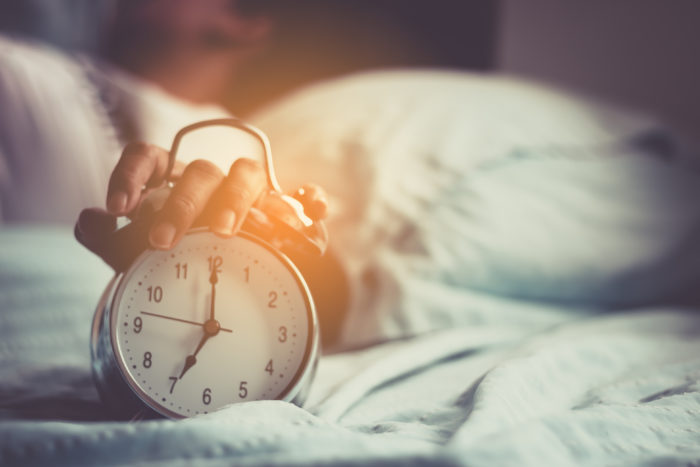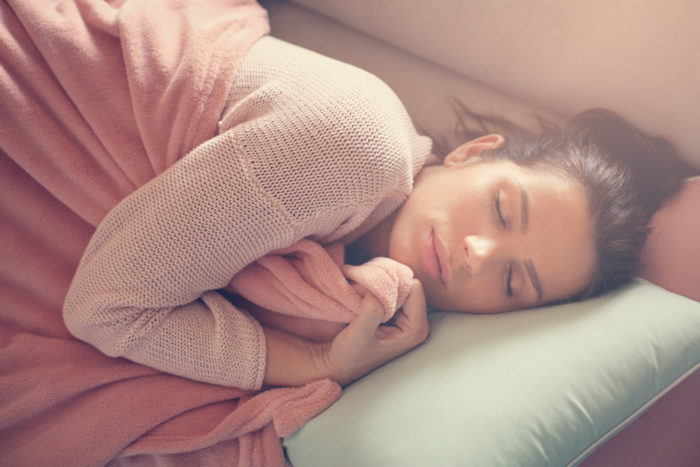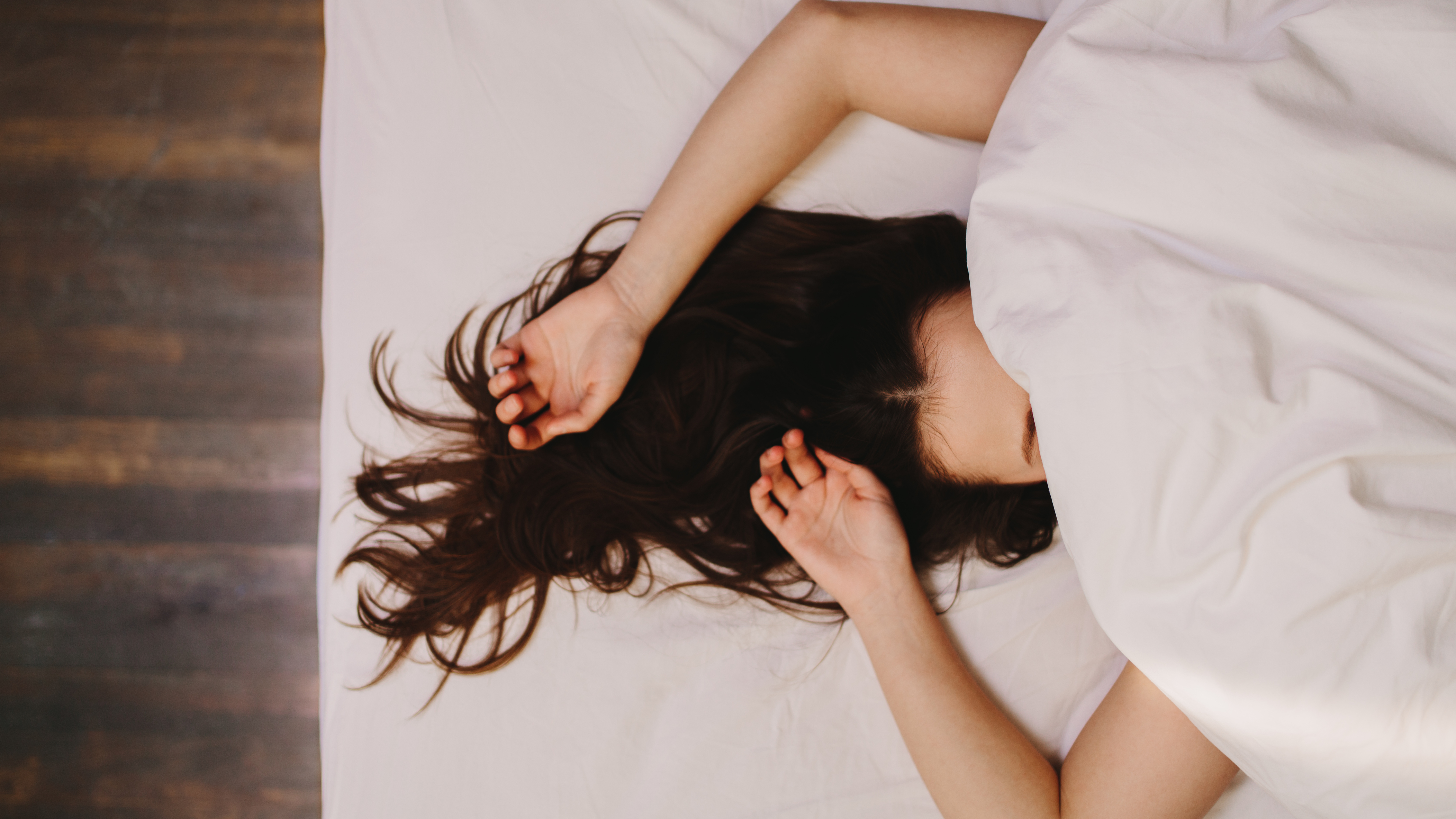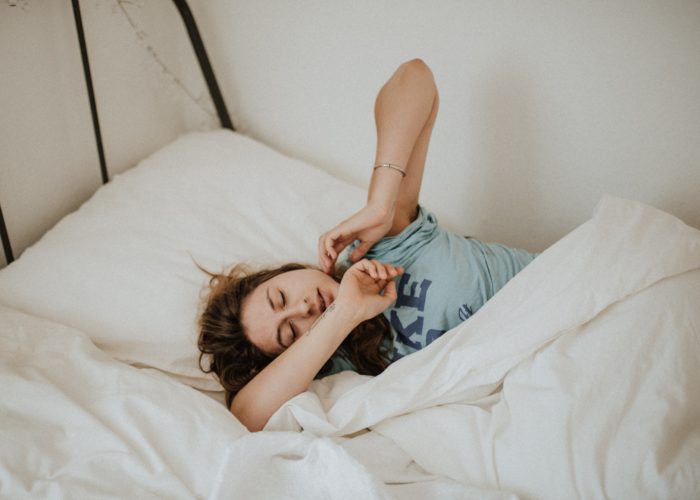Struggling to meet your weight loss goals despite doing everything right? Your sleep habits (or lack thereof) could be to blame.
If you’re being consistent with your training and weight-loss promoting diet, but still aren’t seeing the results you’re expecting, your sleep habits could be the missing link.
Sleep is an often overlooked form of self care. And it’s something that is sorely lacking in today’s “get up and go” society.
Ensuring that you’re nourishing your body with the proper amount of sleep each night is a practice that can improve both your physical and mental wellbeing. And it can even help you reach your weight loss goals.
Plus, getting good sleep can do so much more besides helping you lose weight. This form of self-care can also play a role in the development of habits that can help cultivate a deeper sense of self-worth.
When weight loss is approached from a perspective of caring for your body, not depriving it, the results are both more attainable and more sustainable.
This is where sleep comes in to play. There are several scientific reasons why getting good sleep can help you achieve your weight loss goals.
And getting enough sleep every night gets you in the habit of caring for your body. This practice can help you view weight loss in the same light.
In this blog post, you’ll learn:
- How your lack of sleep can impact your weight loss goals
- Benefits of getting enough sleep, other than weight loss
- My tips for getting quality sleep every night
The Connection Between Sleep and Weight Loss
There are several obvious factors that impact your ability to lose weight. Staying in a slight calorie deficit (around 300-500 calories is best) and moderate training will directly impact how much weight your body can lose.
Beyond that, how much and how well you’re sleeping can impact your ability to lose weight.
Let’s dive into a few of the ways that poor sleep habits can keep you from reaching your weight loss goals.

Lack of Sleep Reduces Metabolism
When you’re sleep deprived, the way your body processes food can be affected.
Specifically, the way your body metabolizes carbohydrates is altered with sleep loss. This impaired ability to metabolize glucose in a healthy way can impact your weight loss goals.
One study showed that glucose tolerance (how efficiently your body removes glucose from your blood after eating) was lower in people who slept four hours or less for just six nights.
This may be an extreme condition (unless you’re a new mom!) But it’s not uncommon to get less than 7 hours a night over the course of a few months. And it’s likely this level of sleep deprivation would affect your glucose metabolism in a similar manner.
Impaired glucose tolerance puts you at a greater risk for developing diabetes. It can also be a factor that’s preventing you from losing weight.
Without the ability to efficiently shuttle glucose from your bloodstream to areas of the body that need it, your risk for insulin resistance rises. Insulin resistance is a known factor contributing to the inability to lose weight.
This effect of sleep deprivation on glucose metabolism can be compounded if you’re also consuming a breakfast that is primarily composed of carbohydrates.
Quick-digesting carbs like bagels, donuts, or cereal can be the worst offenders when it comes to spiking blood glucose. But any carb-heavy breakfast without adequate amounts of protein and fat can cause a similar spike in blood sugar. This is more of an issue in conjunction with sleep deprivation.
Ensuring that you’re getting adequate amounts of high-quality sleep every night, and consuming a breakfast that is higher in protein and fats can help keep your metabolism running smoothly and encourage healthy weight loss.

Lack of Sleep Increases Stress Hormones
It’s a two-way street when it comes to the relationship between sleep and stress.
Sleep plays an important role in the regulation of our stress hormone, cortisol. And when our cortisol is out of balance our sleep can become irregular as well.
If you’re not sleeping enough, you’re likely to have elevated cortisol levels. And if you’re under a lot of stress, you’re likely to not be sleeping well.
The sleep-stress relationship can become a vicious cycle that negatively affects our day-to-day lives. Not to mention our ability to lose weight in a healthy way.
Sleep loss, ranging from total sleep deprivation to just 4-8 hours of sleep can result in elevated cortisol levels as early as the following day.
Just a short time without adequate sleep can affect the resiliency of your stress response. This can make you more prone to develop conditions like HPA axis dysfunction (also called “adrenal fatigue”) or even keep you from losing weight.
There is a strong relationship between stress (cortisol) levels and weight gain.
The release of cortisol changes the way your body metabolizes glucose. As we looked at earlier, this altered glucose metabolism and subsequent insulin resistance can make your body hold on to extra body fat.
So your lack of sleep could be keeping both your stress levels and your weight elevated.
Ensuring that you’re getting enough sleep at night and managing your stress during the day can do so much more than just enable healthy, sustainable weight loss.
With improvements to your sleep and stress levels, you’ll likely find that you have more energy and space for things that bring you joy and enable you to reach your goals.

Lack of Sleep Affects Hunger Signaling
Sleep deprivation can impact your perception of hunger. And you’re likely to eat more if you’ve gotten less sleep than you would if you’re well-slept.
Hormones determine whether we feel hungry or not. When we haven’t gotten enough sleep, the production of these hormones is affected. This can lead to altered hunger signaling and unwanted weight gain.
The first hormone that controls hunger is called ghrelin. This hormone is produced in the stomach and is an appetite stimulant. So when you feel hungry after not eating for a while, that’s ghrelin talking.
Leptin is the second hormone that controls whether or not you feel hungry. This hormone is produced by fat cells and works to inhibit hunger. Low levels of leptin signal to your body that you need more food and therefore stimulate your appetite.
Normally, these hormones work together in harmony to control hunger cues and regulate food intake. But when you haven’t been sleeping well, or as much, these hormones can get thrown off.
One large study showed that people getting around five hours of sleep a night had 15% lower leptin levels and 15% higher ghrelin levels than people sleeping eight hours.
The researchers also learned that when people slept less than eight hours a night, their decreased sleep was proportional to an increase in BMI. This means that the people who slept the least also had the highest BMI.
Now, there are likely other factors at play that affected these participants’ BMI. And it’s important to remember that BMI isn’t a good indicator of overall health.
But this study does show that getting less sleep impacts our appetite signaling – and in turn, potentially our ability to lose weight.

Lack of Sleep Increases Cravings
You might be eating an appropriate amount of food during the day, but what happens when the lights go off? Are you in bed asleep or are you awake snacking on processed foods in front of the TV? The latter is far more common than you might realize, even in people who consider themselves health conscious.
This may be because people who sleep less are more likely to have more cravings for food that is high in sugar, fat, and salt.
Research shows that people who get less sleep (think less than five and a half hours a night) eat close to 400 calories more a day than people who get enough sleep.
Sleep-deprived people both ate more calories and chose to eat more fat and less protein than those who were well slept.
This could be due to a variety of factors. For one, if you’re awake longer you’re likely to be burning more calories than if you’re sleeping. So perhaps your total needs are a bit higher.
But sleep deprivation has a negative effect on the part of your brain that controls decision making. Along with the imbalance of hunger signaling hormones, this can be the perfect storm for giving in to junk food cravings on a nightly basis.
Now, I’m not saying that processed food is “the enemy” or to be avoided 100% of the time in all cases. It’s important not to feel deprived or restricted mentally, even if you’re working on a weight loss goal.
And as long as you’re in a calorie deficit, you can have some treats as part of a healthy weight loss diet. But if you’re struggling to lose weight and aren’t getting enough sleep, those cravings for pizza and ice cream could simply be a result of your lack of zzz’s.
Would you like to save this post?
Your email address is 100% safe and will never be sent spam.
So instead of reaching for the Oreos at 11PM while you keep up with the Kardashians, try going to bed earlier and see if your sweet craving is really just your body’s way of asking for more energy through getting enough sleep!

Benefits of Getting Enough Sleep (Other than Weight Loss)
Not getting enough sleep can play a role in keeping you from achieving your weight loss goals. If you’ve reached a weight loss plateau, it’s possible that focusing on getting enough sleep is all it will take for your body to start losing weight again.
But, weight loss shouldn’t be your only motivation for improving your sleep habits and getting more shut-eye.
Getting enough sleep is so important for a host of other factors that impact your health and wellbeing. The benefits of good sleep can help you feel your best and live a healthy, meaningful life, well beyond any weight loss goals.

Sleep Balances Hormones
Not sleeping enough can negatively affect your hormones. So it makes sense that getting plenty of sleep can help balance your hormones.
This is mainly due to the effects that your circadian rhythm has on hormone balance.
A “circadian rhythm” is the umbrella term used for a 24-hour cycle that impacts almost every system in our body.
It tells us that we should be awake when it’s light outside and asleep when it’s dark. This light-dark rhythm also tells our bodies when to produce certain hormones and when not to.
Having a healthy circadian rhythm encourages the balance of hormones like growth hormone, melatonin, cortisol, leptin, ghrelin, estrogen, progesterone, FSH, and many more.
Most of these hormones aren’t produced consistently 24 hours a day but on a cycle. This 24-hour light and dark cycle is what drives our circadian rhythm.
That’s why sleeping enough and at similar times every day helps to keep our hormones balanced and our bodies running like actual clockwork.

Sleep Improves Workout Recovery
Sleep is a critical tool for proper muscle recovery and rebuilding.
While sleeping, your body is able to focus all of its attention on repairing damaged cells and muscle tissue. Both of which are critical when it comes to recovering from any sort of training.
Getting enough sleep allows your body time to complete proper protein synthesis processes that are critical to rebuild and strengthen muscle.
We consciously include recovery practices into our training when we have cool-down periods and rest days after an intense workout. Making sure you’re getting enough sleep is just one more component of a healthy workout routine.

Sleep Improves Mood
The effects of the lack of sleep on our mood is fairly obvious. We don’t need research to tell us that getting less sleep makes us more irritable, anxious, and sad.
Sleep disruption, or not sleeping long enough, can impact the signals sent by neurotransmitters in our brain. Scientists are still trying to determine the exact mechanisms behind why poor sleep makes us moody. But we can’t deny that the observations around sleep and mood changes are real.
Not getting enough REM (“rapid eye movement,” also known as deep) sleep is known to impact our emotional health. REM sleep usually begins after you’ve been asleep for at least 90 minutes and typically lasts for around 10 minutes at a time. Ideally, in a good night’s sleep, you’ll go through four to five of these deep sleep cycles.
Getting enough REM sleep helps to balance your mood and keep you feeling alert and energetic during the day. If your sleep is shortened or interrupted, you won’t have as many REM cycles. This can lead to decreases in mood and alertness.

Tips for Getting Quality Sleep
We can’t argue that sleep is a critical component of a healthy, vibrant life. Whether you want to lose weight, improve athletic performance, or just feel more like yourself, sleep can play an important role.
But getting a good night’s sleep is often way easier said than done. We live active, busy lifestyles, and many days sleep is the last thing on our to-do list.
When we view sleep as not just one more item on our to-do lists, but as a critical form of self-care, it becomes something that holds a little more weight in our day.
So here are just a few tips to help you start making sleep an act of self-care.

Sleep Tip #1: Have a Consistent Bedtime
Setting a bedtime for yourself may make you feel like a kid again. But trust me when I say this is one of the best habits to make when it comes to improving your sleep.
You likely have a set time to wake up in the morning. So it makes sense that you should have a set time you go to sleep at night as well.
I recommend aiming for 7-9 hours of sleep a night. When choosing your bedtime, be sure to factor in the amount of time it takes you to actually fall asleep – ideally 10-20 minutes in a healthy person.
You can use a recurring reminder on your phone – some phones even have a specific bedtime alarm.
It’s important to choose a method for getting to sleep on time that works for you. Just setting a bedtime won’t help you sleep better if you don’t actually follow through consistently.

Sleep Tip #2: Establish a Bedtime Routine
If you’ve ever tried to fall asleep after watching a stimulating movie or working on homework, you know how difficult it can be to get your brain to shut off.
This is why establishing a calming bedtime routine is so critical for enabling quality sleep.
It doesn’t have to be anything elaborate. Finding time to get enough sleep is in itself difficult, let-alone create a bedtime routine. I recommend creating a bedtime routine that fits into your life, not the other way around.
The goal isn’t to create an extensive, Instagram-worthy nighttime ritual. Instead, focus on activities that you enjoy and help you unwind from your day.
Calming activities that can help prepare your body for sleep can be reading, journaling, drinking a warm cup of tea, or taking a hot bath or shower.
Aim to make these routines simple and relaxing, and that will bring you joy and contentment.

Sleep Tip #3: Create a comfortable environment
The environment you sleep in is critical when it comes to getting a good night’s sleep.
This often means reducing any sounds and making sure your room is dark and at a comfortable temperature.
The National Sleep Foundation recommends sleeping in a room that is around 65 degrees Fahrenheit. For many people, this temperature can feel downright cold, especially at first. Instead of jumping straight to 65ºF, you can slowly decrease the temperature in your bedroom until you find one that works for you. You’ll know it works when you can fall asleep comfortably and stay asleep through the night.
Our circadian rhythms and melatonin production (the sleep hormone) are very sensitive to light. Yes, even the light from your television screen and cell phone.
Wearing blue blocking glasses can help keep your melatonin production at normal levels at night. You can even continue to use electronics without suffering the melatonin depleting effects of the screen time.
Since phones and t.v.’s can be mentally stimulating, however, I challenge you to completely turn them off before you go to bed. Two hours of no screen time before bed is ideal. But any amount of time not in front of a screen before you go to sleep will provide benefit.
The Bottom Line on Sleep and Weight Loss
Sleep is likely not going to be the deciding factor when it comes to your ability to lose weight or not.
But, coupled with other weight-loss conducive practices, getting enough sleep can help provide a strong foundation that supports healthy, sustainable weight loss and overall improved health.
Everything from your stress levels to your hormone production can be affected by your sleep. Making sleep a priority, and not chucking it to the bottom of your to-do list, can go a long way when it comes to living a healthy, productive life.
Now it’s your turn – how’s your sleep? What benefits do you see in your life of getting enough sleep? What are your biggest barriers to sleeping more? Let me know in the comments!
This post may contain affiliate links. If you click on a link and make a purchase, I may receive a small commission.


+ show Comments
- Hide Comments
add a comment